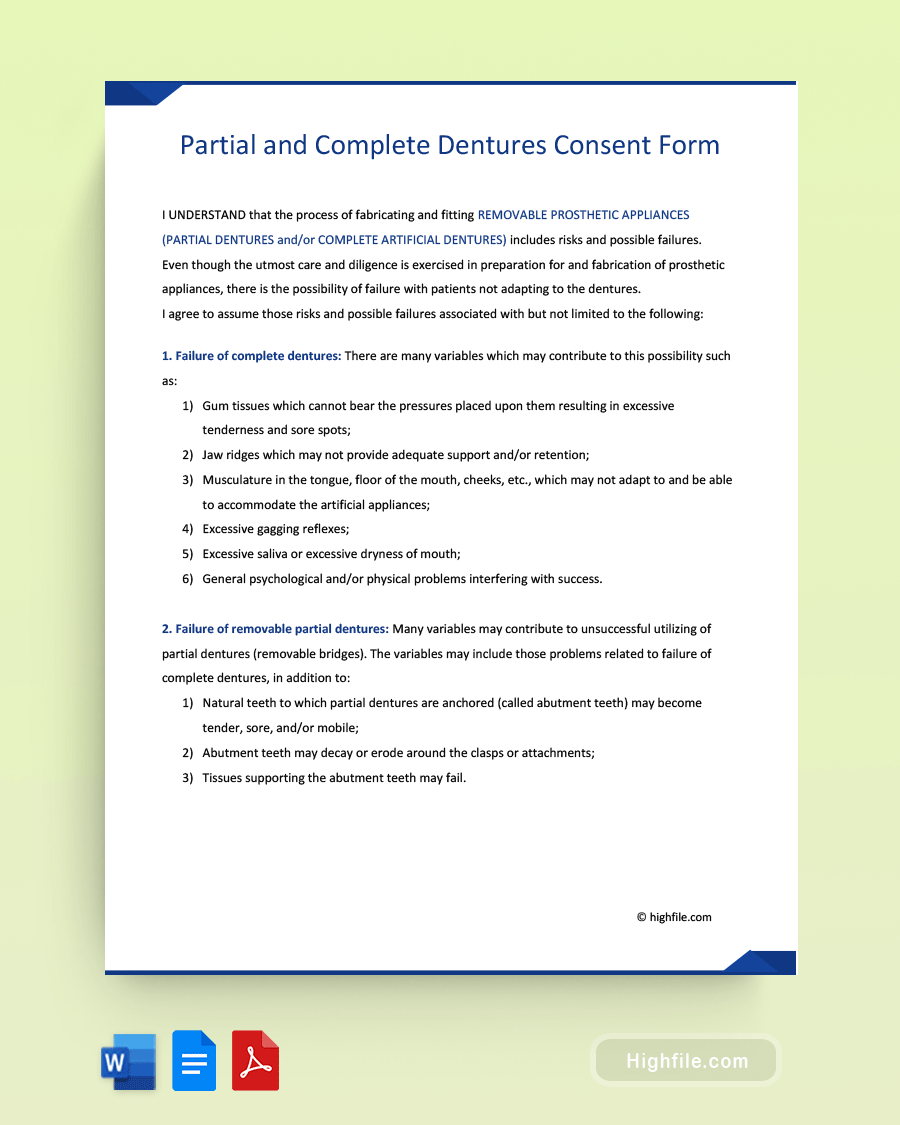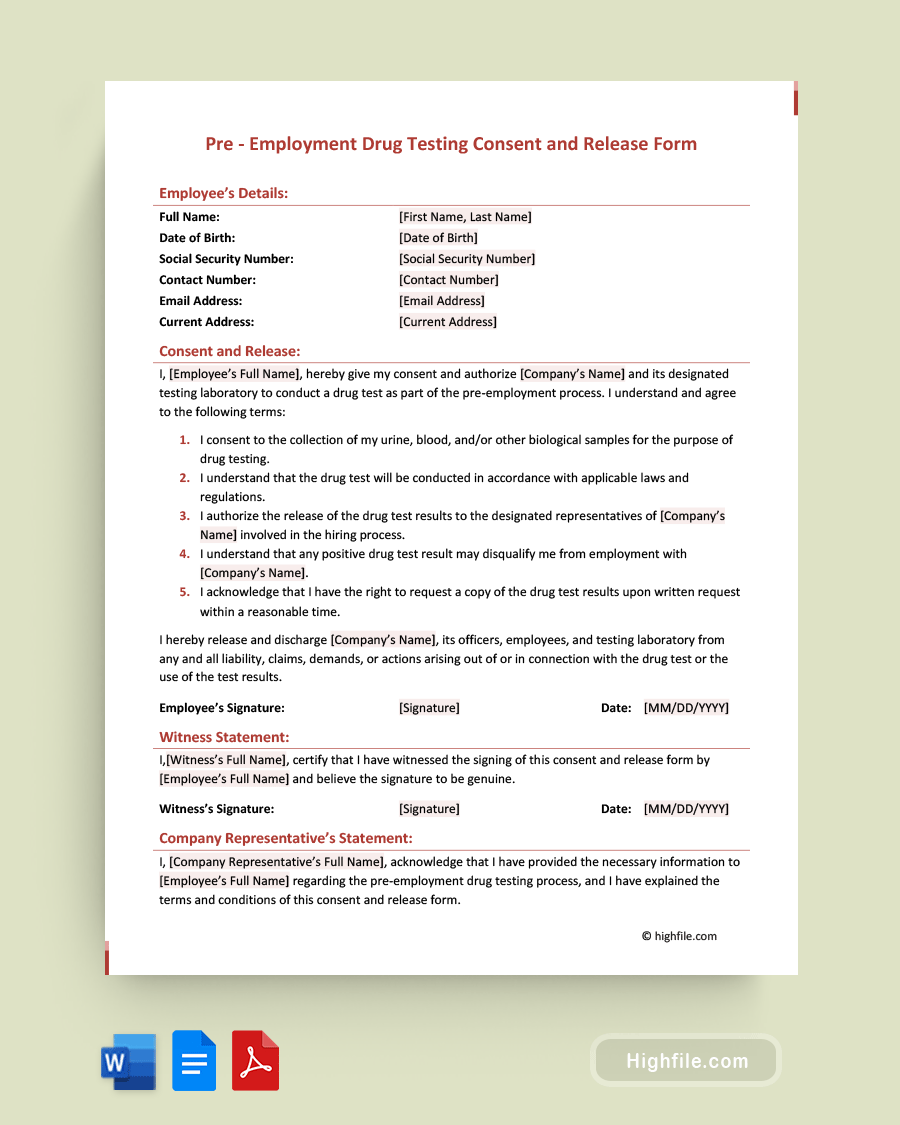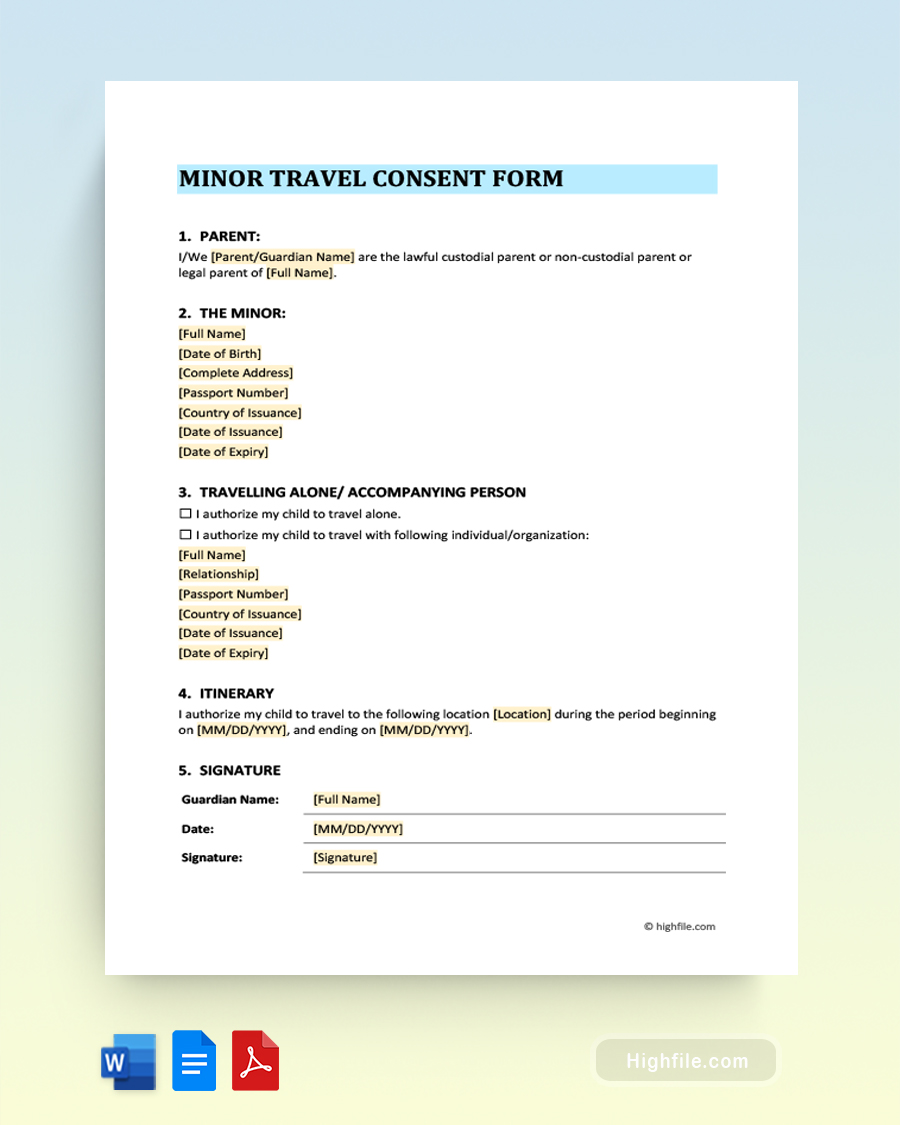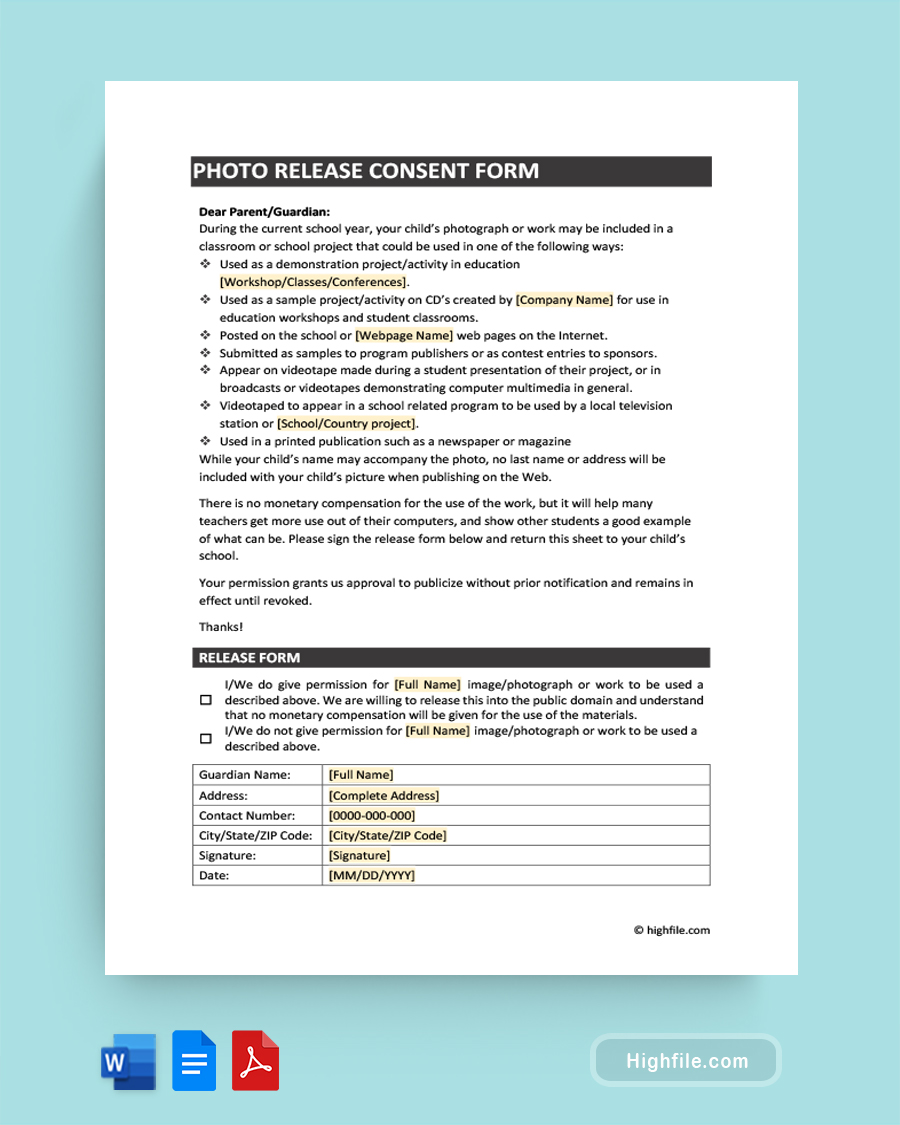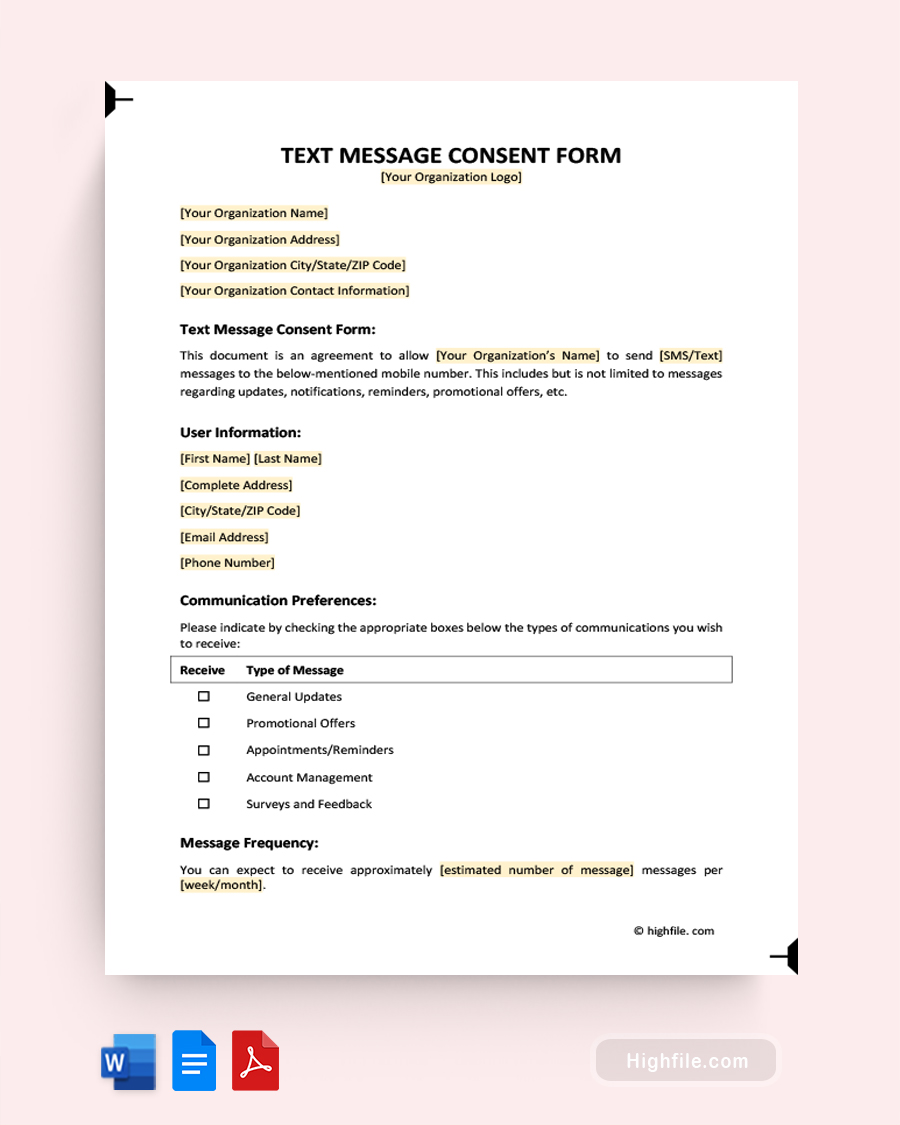Getting dentures can significantly improve the quality of life for a patient, but they must agree with the proposed treatment first. A denture consent form outlines the details of a denture treatment plan and helps ensure that the patient is satisfied with the outcome. The form includes information about the type of denture being used (full or partial), the materials used, the expected outcome, and any risks associated with the treatment. It also outlines the patient’s rights and responsibilities during the treatment process. By signing this form, the patient agrees to follow all instructions given by their dentist and acknowledges that they understand the risks associated with the treatment. This document also serves as a record of communication between the dentist and patient, which can help ensure that both parties are satisfied with the treatment. Using a high-quality Denture Consent Form template saves time and enables you to ensure that your document respects patient rights, covers you legally, and adheres to all applicable laws.
What Is a Denture Consent Form?
A Denture Consent Form documents the patient’s agreement to receive dentures. The form may include the following:
- Information regarding the patient’s general dental health.
- The type of dentures being provided.
- The cost of the dentures.
- Any other important information related to the procedure.
In addition, the form may also require several parties to sign and date it to validate the agreement. Having patients, witnesses, and dentists sign off on the consent form ensures that all parties understand and agree to the terms and conditions outlined in the document.
Why is Denture Consent Form Important?
A Denture Consent Form is important because it is a legal document that outlines the risks and benefits of this treatment. For a Denture Consent Form to be legally binding, it must have the patient’s signature, and they must voluntarily give their informed consent. Here are some additional reasons why these documents are vital:
- It protects the dentist from legal repercussions
- It encourages open dialogue and can help foster trust with patients
- It reminds the patient of their obligations and rights
- It is a required part of medical and dental recordkeeping
- It includes space for the consent for the final processing of the dentures
- It gives the dentist the right to bill the client or their insurance company accordingly
Essential Elements of a Denture Consent Form
The essential elements of a denture consent form are composed mainly of the risks involved in this treatment but also include the consent for final processing and other critical segments. Below we’ve provided an outline that shows what to expect and why each part is necessary.
- (Optional) Business Name or Logo- Including your business name or logo is optional, but it is a standard business practice that adds a professional touch.
- Form Title- The title is “Denture Consent Form,” or a variation thereof, and should always be in bold print at the top of this document.
- Comprehension of Risk Statement- The comprehension statement says that the patient understands the process and its risks and agrees to undergo this treatment.
- Risk Awareness Statements- These statements cover the common risks and discomforts of getting dentures.
- Bold Patient Responsibility Statement- This statement is in bold print. It reminds the patient of their responsibility in the event of a problem and the need to make and keep appointments for regular evaluations.
- Informed Consent Statement- An informed consent statement shows that the patient has discussed this process with their dentist, asked any clarifying questions, knows that the process is not guaranteed, and agrees to allow a specifically named dentist to proceed.
- Patient Signature and Date- Signatures make the form legally binding.
- Parent, Guardian, or Legal Representative Signature and Date- This line only applies to underage people who cannot otherwise consent on their own behalf.
- Witness Signature and Date- The witness ensures that an outside party saw the patient sign the form.
- Consent For Final Processing- This is a brief statement that says the patient has seen the dentures in their mouth and approves of the fit, feel, color, shape, and other aspects.
- Patient Signature and Date- The patient must sign again before the final processing.
- Parent, Guardian, or Legal Representative Signature and Date- As above, this is for those who cannot consent on their own.
- Witness Signature and Date- A witness is also necessary during this step to ensure the patient signs of their own free will.
- Dentist Signature and Date- Finally, the dentist signs off on the final processing to show they feel it is appropriate at this time.
Pro Tip: Denture consent forms are legally binding documents. As such, it is vital to ensure they are complete and correct and that all the information is current and up to your area’s standards and legal requirements. If you are still determining the requirements for your denture consent form, consult your licensing board or an attorney for further information on these topics.
Who Should Sign a Denture Consent Form?
In general, patients should sign their denture consent form unless they cannot do so on their own behalf. That said, if someone else is their designated legal representative or caretaker, like their parent or sibling, they can sign for them instead of the patient. If the patient is a minor, they need a parent or guardian’s signature. Additionally, the dentist and a witness should also sign the form.
Legal Considerations for Denture Consent Forms
The legal considerations for denture consent forms in the United States are covered by state law and are quite varied. It is imperative that dentists creating denture consent forms be aware of the legal considerations and familiar with the pertinent state laws where they reside. Some states have specific requirements for the content of consent forms, while others have no such requirements. For example, Virginia requires that consent forms include information about the risks and benefits of dental work and the need for a general anesthetic. Meanwhile, California does not. However, some standards are set by the American Dental Association’s Code of Ethics. Here are a few other legal considerations to keep in mind when composing your denture consent form.
- Malpractice- A Denture Consent Form is an important document to keep on hand in the event of a malpractice claim. It can be used as evidence that your patient was fully informed of the risks and benefits and voluntarily consented to proceed with treatment. Ensure your forms are complete, current, and aligned with local laws and best practices.
- HIPAA- Take the time to check that your document adheres to HIPAA standards. When completed, the consent forms you produce will contain important personal and medical data. As such, they are considered private and must be treated accordingly and stored securely. Moreover, to share this with other dentists, medical professionals, or even members of the patient’s family, you must obtain an additional consent form that allows you to distribute and discuss the data on the denture consent form.
- Standards of Care- You must ensure that the treatment is consistent with the current standards of care for any reasonable and prudent dentist performing a similar procedure.
- Medical Recordkeeping- Denture consent forms are essential in any patient’s medical file and must be included as part of their permanent record.
- Informed Consent- A Denture Consent Form serves as documentation that the patient has given their informed consent for treatment. Informed consent means that the patient has asked questions and been fully apprised of the risks and benefits of dentures and any alternative options for treatment.
- Signatures and e-Signatures- You must check that your forms have the appropriate signature or eSignature attached. In some areas eSignatures may not be considered acceptable, so you need to check your local laws to make sure you have a legally valid signature on your document. If necessary, print out a physical copy even if you used eSignatures in the past when you practiced in other areas.
FAQs
To help you get the most out of your denture consent form template, we’ve answered the most frequently asked questions about this topic below. Here you’ll learn whether to provide copies of denture consent forms to your patients, how these vital documents protect you against malpractice claims, and more.
A denture consent form can be modified or updated after it has been signed. Depending on the specific situation and the dentist’s preferences, the document may need to be updated to reflect changes in the patient’s health or treatment plan. If the patient and dentist agree to change the form, they should both sign a written agreement outlining the changes. This agreement should be kept on file in case of any disputes or questions in the future.
A Denture Consent Form is an important document that helps to protect dentists and other dental professionals from malpractice claims. The form serves as a written agreement between the patient and the dentist outlining the risks and benefits of getting dentures. It also allows the patient to ask questions and ensure they understand what is being proposed.
By signing the Denture Consent Form, the patient agrees to the proposed procedure and indicates they are aware of potential risks or complications. This helps ensure that the patient was adequately informed before any treatment was performed and thus provides legal protection in case of medical malpractice. The Denture Consent Form should be signed by the patient or a person able to act on their behalf before any treatment is performed.
A Denture Consent Form can be used for both complete and partial dentures. The form should include details about the type of denture being made, the materials used, the expected outcome, any risks or complications associated with the procedure, and the patient’s consent to proceed. The form should also include information about the dentist’s experience with this type of denture and any additional relevant information.
A copy of the Denture Consent Form should be provided to the patient. This form serves as an agreement between the patient and the dentist that the patient has given informed consent for the procedure. It can also serve as a record of the patient’s consent for reference. Having a copy allows the patient to provide access to future dentists or doctors, even if the original is lost, destroyed, or inaccessible.
A Denture Consent Form is a document that outlines the details of a denture treatment plan and helps ensure that the patient is satisfied with the outcome. The form includes information about the type of denture being used, the materials used, the expected outcome, and any risks associated with the treatment. It also outlines the patient’s rights and responsibilities during the treatment process. By signing a Denture Consent Form, the patient is open to any treatment required by their dentist. The Denture Consent Form can prevent future problems with dentures by ensuring they understand the likely outcome, which may help improve a patient’s satisfaction with the final product.
Final Thoughts
This Denture Consent Form is designed to provide patients with the information necessary to make an informed decision about whether or not to receive dentures. Please have them read carefully and ask questions if anything needs clarification. By signing this form, the patient permits the dentist or dental laboratory to fabricate full or partial dentures to fit their mouth. The document includes information about the type of denture and materials used, the expected outcome, and any risks associated with the treatment. It outlines their rights and responsibilities during and after treatment, shows they agreed to follow all instructions given by their dentist and acknowledges that they understand the need for future appointments. The form also serves as a record of communication between the dentist and patient, which can help ensure that both parties are satisfied with the treatment. A professionally designed denture consent form template will help you quickly create a high-quality document for your dental practice.
